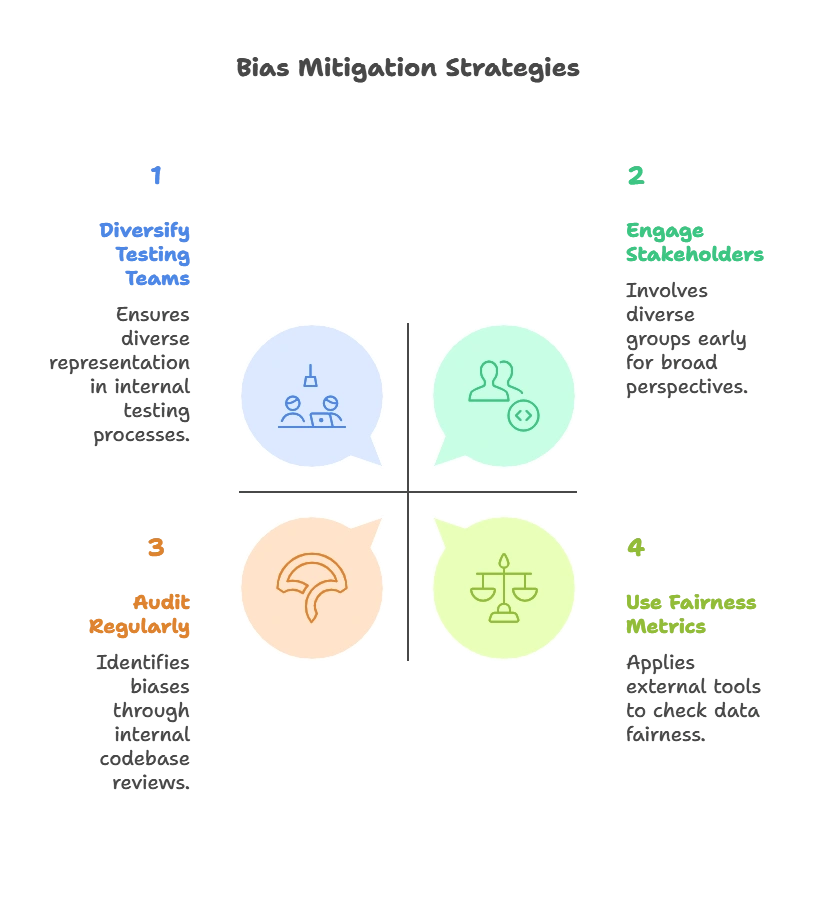Ethical Considerations in Node.js Development: Data Privacy and Bias Mitigation
In modern software development, ethics plays a crucial role. As developers, our work can significantly impact individuals, communities, and society at large. This chapter will explore ethical considerations in Node.js development, focusing on two key areas: data privacy and bias mitigation. We’ll break down these topics from basic concepts to advanced practices, including practical examples, and conclude with some final thoughts.
Data Privacy in Node.js Development
a. Introduction to Data Privacy
Data privacy refers to the proper handling, processing, storage, and protection of personal data. In Node.js applications, which are often used to build web servers and APIs, developers handle large amounts of user data. This makes understanding data privacy essential.
b. Legal and Regulatory Aspects
Data privacy laws such as GDPR (General Data Protection Regulation) in Europe and CCPA (California Consumer Privacy Act) in the US, enforce stringent rules about how companies handle personal data. As a Node.js developer, you must ensure that your application is compliant with these laws to avoid legal issues and protect users’ data.
c. Common Privacy Vulnerabilities
- Data Leaks: Improper handling of sensitive information (e.g., passwords, credit card info) can lead to data breaches.
- Insufficient Encryption: Transmitting sensitive data without encryption (e.g., plain-text passwords) exposes it to attackers.
d. Implementing Data Privacy in Node.js
i. Encryption and Hashing
Encryption ensures that sensitive data is unreadable by unauthorized users. One common practice is using SSL/TLS for secure communication between clients and servers.
In Node.js, the crypto module allows you to hash and encrypt data.
Example of Hashing Passwords:
const crypto = require('crypto');
const hashPassword = (password) => {
const hash = crypto.createHash('sha256');
hash.update(password);
return hash.digest('hex');
};
const userPassword = 'mySecurePassword123';
console.log(hashPassword(userPassword)); // prints hashed password
Here, instead of storing the raw password, we hash it using the crypto.createHash() function. This ensures that even if the database is compromised, passwords are protected.
ii. Implementing HTTPS in Node.js
Using HTTPS ensures that communication between the client and server is encrypted. You can set up an HTTPS server in Node.js like this:
const crypto = require('crypto');
const hashPassword = (password) => {
const hash = crypto.createHash('sha256');
hash.update(password);
return hash.digest('hex');
};
const userPassword = 'mySecurePassword123';
console.log(hashPassword(userPassword)); // prints hashed password
This setup requires SSL certificates, which encrypt the traffic.
iii. Securing API Requests
Another aspect of privacy is making sure APIs are secure. One way to do this is by implementing token-based authentication (e.g., JWTs).
Example of JWT Authentication:
const jwt = require('jsonwebtoken');
const token = jwt.sign({ userId: 123 }, 'secretKey', { expiresIn: '1h' });
console.log(token); // Generates a token valid for 1 hour
// Verifying the token
jwt.verify(token, 'secretKey', (err, decoded) => {
if (err) {
console.log('Invalid token');
} else {
console.log('Decoded data:', decoded);
}
});
This approach allows users to authenticate securely without exposing sensitive information.
iv. Best Practices for Data Privacy
- Limit Data Collection: Only collect necessary data (data minimization).
- Use Secure Protocols: Always use HTTPS to encrypt data.
- Regular Security Audits: Regularly test your application for security vulnerabilities.
- Data Anonymization: Use techniques like tokenization or pseudonymization to reduce the risk of sensitive data being exposed.
Bias Mitigation in Node.js Development
a Introduction to Bias in Software Development
Bias in software refers to when an application systematically disadvantages certain groups of users. This can occur through algorithms or data that reflect existing societal biases. As developers, it’s crucial to be aware of this and take steps to mitigate bias.
b. Types of Bias in Software
- Algorithmic Bias: When the underlying code unintentionally favors or discriminates against certain groups.
- Data Bias: When the training data or inputs contain biases that affect the output.
c. Mitigating Bias in Node.js Applications
Bias mitigation in Node.js involves several strategies:
Inclusive User Input Validation
Ensure that user input validation doesn’t exclude certain groups. For example, if you’re validating names or phone numbers, avoid assumptions based on regional or cultural norms.
Example:
const validatePhoneNumber = (phone) => {
const phoneRegex = /^[0-9]{10}$/; // Assumes 10-digit phone numbers
return phoneRegex.test(phone);
};
// This might exclude valid phone numbers from countries with different formats
To avoid regional bias, consider accepting various formats and using libraries like libphonenumber-js.
Avoiding Hard-Coded Assumptions
Hard-coding assumptions about users (e.g., gender, language) can introduce bias. For instance, always assuming that a user’s language is English could disadvantage non-English speakers.
Fair Algorithm Design
Bias can be introduced when developing algorithms for decision-making systems (e.g., loan approvals, hiring platforms). To mitigate this:
- Test with Diverse Data: Ensure that the training data includes diverse demographic groups.
- Monitor and Adjust Models: Regularly monitor algorithm outputs to detect bias and adjust as necessary.
Example: Using Machine Learning Fairness Libraries in Node.js
To tackle algorithmic bias, you can integrate fairness-checking libraries. For instance, if your Node.js application uses a machine learning model via a Python service, you can integrate tools like Fairness Indicators to detect biases in your model.
Best Practices for Bias Mitigation
- Diversify Testing Teams: Ensure that the teams testing your application represent diverse groups.
- Use Fairness Metrics: Apply fairness-checking tools to your data and models.
- Audit Regularly: Perform regular audits on your codebase and algorithms to identify potential biases.
- Engage Stakeholders: Involve diverse user groups in the development process to ensure broad perspectives.

Ensuring ethical standards in Node.js development involves a commitment to protecting user privacy and addressing bias. Both require continuous attention, regular audits, and the use of best practices and tools. By integrating robust privacy controls and actively working to mitigate bias, developers can build applications that are not only technically sound but also fair and safe for all users.Remember, ethical considerations are not just a checklist but an ongoing responsibility. As technology evolves, new ethical challenges will arise, and staying informed and proactive is crucial to responsible development.Happy coding !❤️
